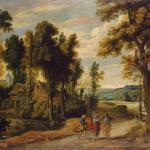Where there is no music, there is no dialectic. Where there is no art, there is no education.
This late spring early summer, I have turned my thoughts toward the centrality of music and the other fine arts for education. Music matters: the Church started teaching me this as a boy and Plato clarified my thinking as a young man. Later the mothers and fathers of the Church kept repeating as I read their writings that in this is our Father’s world and our listening ears could hear the music of the spheres and our eyes see the beauty of His creation. JRR Tolkien reminded me that as creatures in God’s image, every human is called to create, a sub-creation of the divine creation.
The fine arts are too important to be left to the professionals! Still the trained and accomplished are there to show us the way and help us see and hear goodness, truth, and beauty clearly. Here is a skilled musician and director of fine arts program with some fresh thoughts for our summer Lauren Turner:

Why fine art?
We do not teach music, visual art and theater at the Saint Constantine School because it is good for students. We do not emphasize fine arts because they inculcate in those who practice them a sense of discipline, pride of accomplishment, or true cooperation with others and the world around them. We do not introduce students to these arts because we have a desire for our students to become “well-rounded” and we certainly do not educate our students in the fine arts with the hope that they may, one day, become rich and famous. While all of these are great reasons to support arts education, they are not why we teach them.
Why then, do we value fine arts so greatly here at The Saint Constantine School?
We teach the arts in order to lead our students to recognize beauty. We teach them to desire to dwell with beauty and create beauty. To actively seek beauty in all things. Not occasionally but constantly and continuously. By immersing our students in the arts, we teach them not only to recognize beauty in sound, color, shapes and stories but also to acknowledge the beauty in mathematical equations, in scientific processes, in well-composed prose, in human relationships, morality and virtue and the human body. We teach them to find beauty in the trees, the earth and the dirt beneath our feet and sometimes on our hands.
As important as it is to teach our students to recognize and seek beauty, it is equally as important to teach them to recognize and reject that which is not beautiful. At first, those may seem like the same thing but truly, they are not. The acts of discerning what is beautiful and what is not beautiful are slightly different and require distinctive actions and reactions which themselves need to be studied and cultivated. At its core, learning to read music is really learning about the relationship of pitch and rhythm to silence, learning about painting is learning to understand the relationship between color and space and the lack thereof and the power of theater lies not only in the lines someone delivers but also in the unspoken thoughts, feeling and emotions which compels the character to act. Recognizing and respecting these differences are integral to the use of the dialectic, a foundational element of education at our School.
Our students are engaged in a society at large that is constantly telling them that some of the most beautiful things in the world are not only not beautiful but repugnant and should be cast aside in favor of things which are more appealing. The world around all of us is wrought with messages of choosing self-preservation over integrity, self-promotion over humility, taking over giving, showing over doing and consuming over creating. True art cannot be consumed but rather requires the formation of a relationship. Just as evil can never beget goodness and lies can never give way to truth, ugliness can never produce beauty.
The beauty of a person with a well-developed mind through an education rooted in the trivium and quadrivium is that they develop proficiency in subjects which themselves produce, recognize and revere true beauty. To be able to seek and recognize beauty is to be able to seek and recognize God.
So why do we emphasize the fine arts at the Saint Constantine School? The answer can be found in part in our school’s mission statement, “To nurture the minds and hearts of students for their own salvation, for the benefit of the world, and to the glory of God.”
—————-
Lauren Turner is the Director of Fine Arts for the Saint Constantine School and College program in Houston, TX where she also teaches Middle School Choir, Upper School Choir, Faculty Choir and Upper School Music History and Theory. Lauren is a member of the Houston Grand Opera Chorus, staff singer for St. Theresa Catholic Church in Sugar Land, Texas, a frequent concert and oratorio soloist in the Greater Houston Area, private voice teacher, writer, wife and mother.












